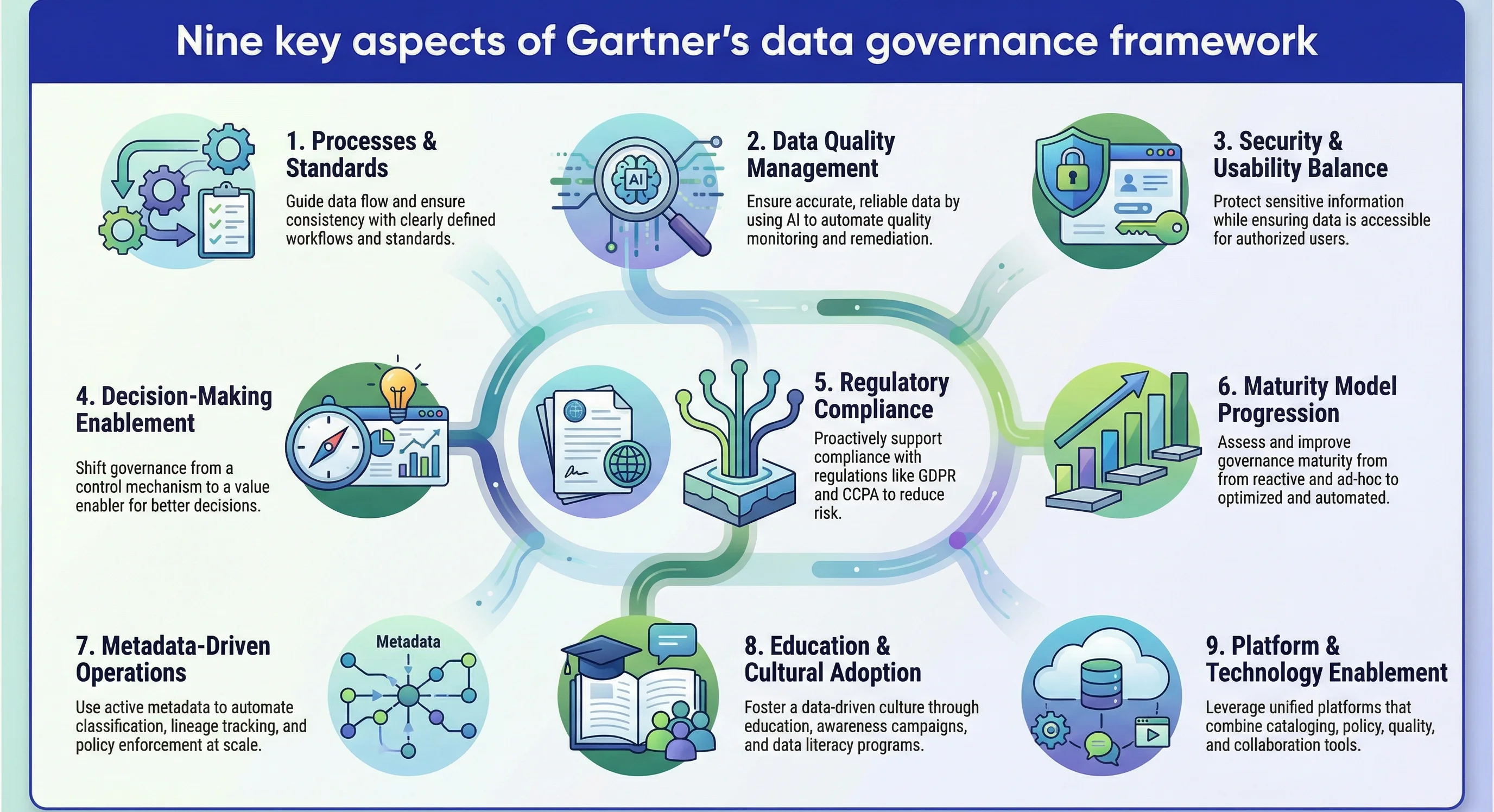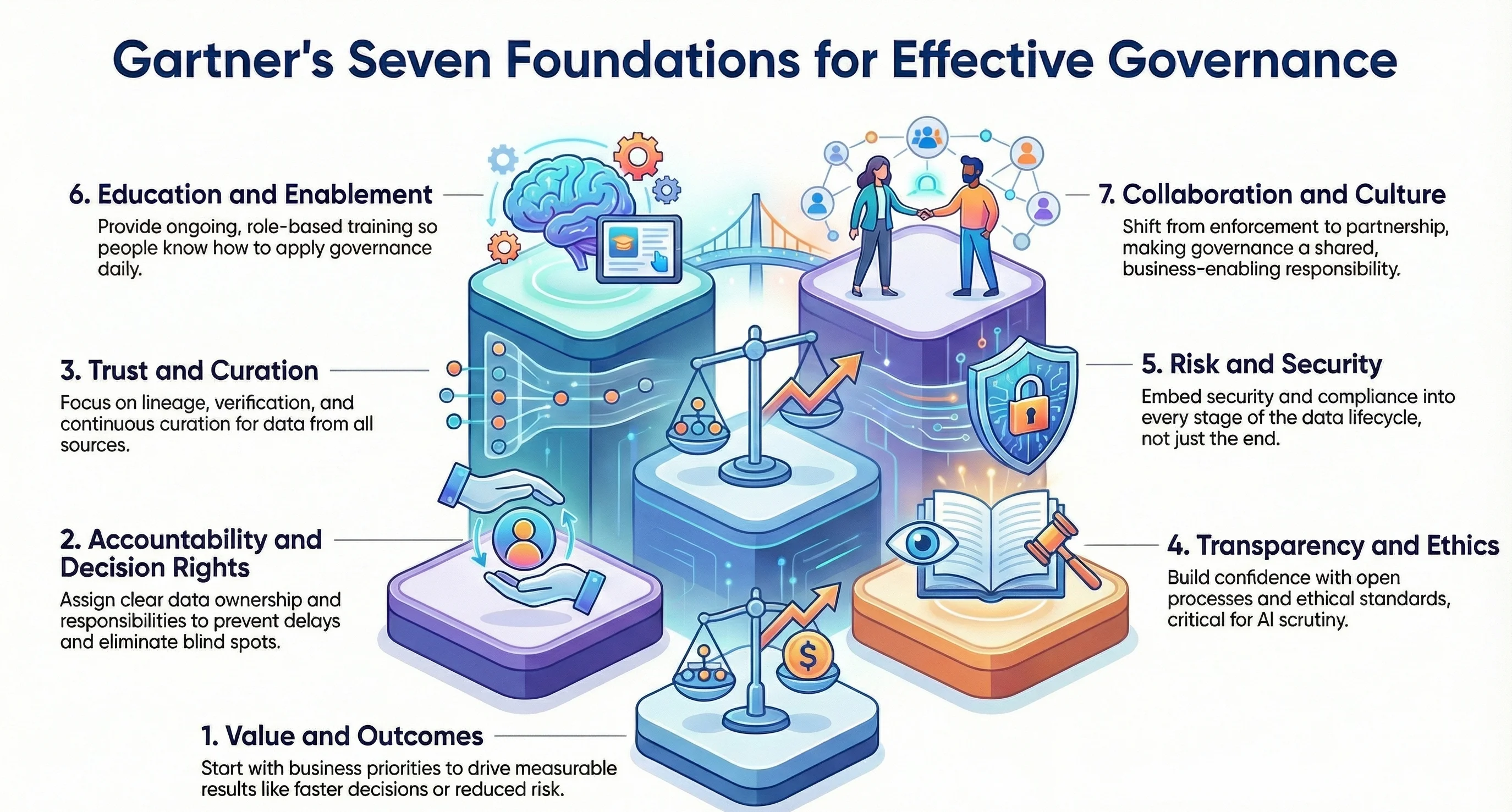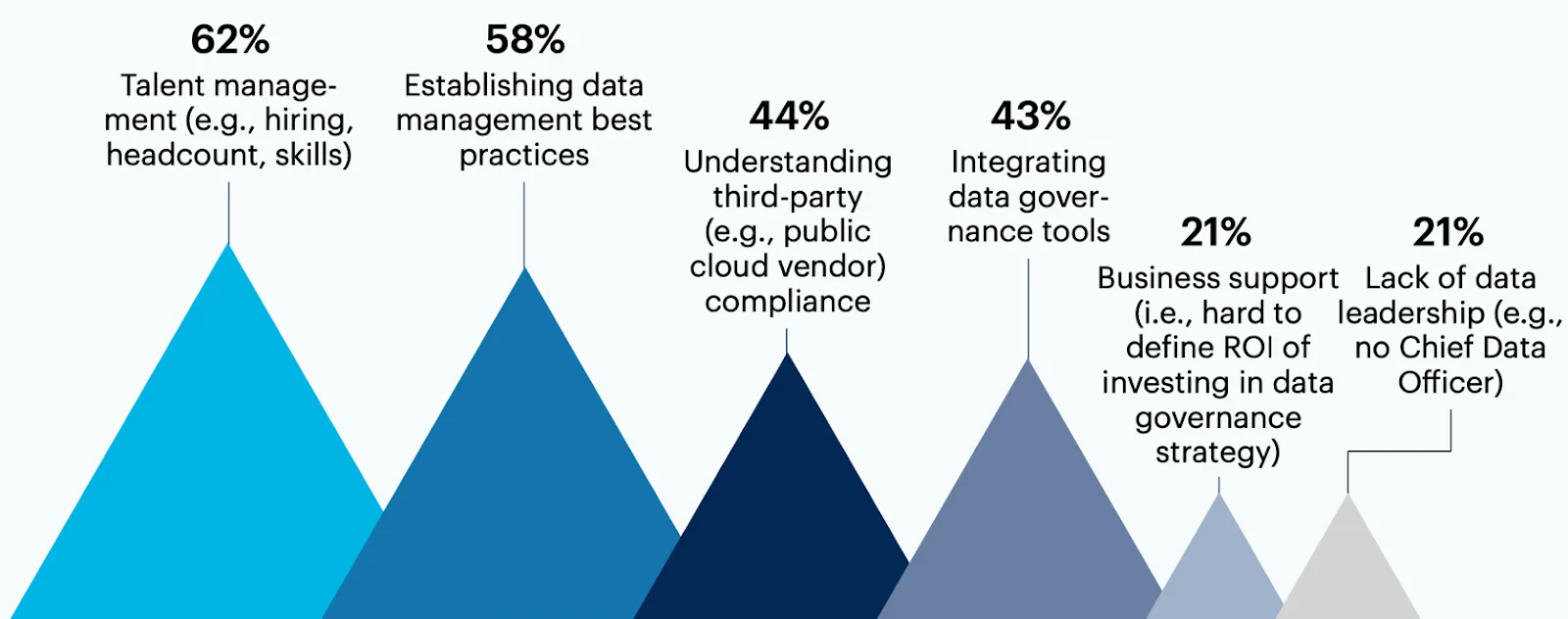Gartner Data Governance: 2026 Framework, Research & Implementation
The Gartner Magic Quadrant for Data and Analytics Governance 2026 is here, uncover the key market shifts and why modern governance leaders stand out. Read insights
What are the nine key aspects of Gartner’s view on data governance?
Permalink to “What are the nine key aspects of Gartner’s view on data governance?”Summarize and analyze this article with 👉 🔮 Google AI Mode or 💬 ChatGPT or 🔍 Perplexity or 🤖 Claude or 🐦 Grok (X) .
Gartner’s perspective on data governance extends beyond technology into organizational processes, cultural adoption, and metadata-driven control.
“Shift [your] data governance strategy from data to outcomes so that business roles within the organization can see the connection between data, its governance and achieving the enterprise mission.” - Gartner on data governance
Below are the key aspects highlighted in their research, which includes the Hype Cycle for Data and Analytics Governance, Market Guide, and Magic Quadrant.
1. Focus on processes and standards
Permalink to “1. Focus on processes and standards”Data governance should be grounded in well-defined processes and standards that guide how data is created, stored, accessed, and shared. This ensures consistency across teams and reduces ambiguity in data handling.
Gartner’s definition and principles of data governance
Permalink to “Gartner’s definition and principles of data governance”Gartner positions data governance as a strategic business capability that enables value creation rather than a technical control function.
The foundation of Gartner’s approach centers on three transformative principles:
For years, data governance was built around control. Clean the data. Lock it down. Check the compliance box. It kept systems safe, but it rarely helped the business move faster. Gartner argues that data governance model is no longer enough.
1. Start with outcomes, not rules
Permalink to “1. Start with outcomes, not rules”Traditional governance treats hygiene as the goal. Outcome-driven governance flips that logic. Success is measured by business impact. Faster launches. Better decisions. Quicker AI adoption. Governance stops being an IT tax and becomes a direct contributor to results.
2. Push decisions closer to the work
Permalink to “2. Push decisions closer to the work”Centralized control cannot scale. Gartner recommends clear accountability with distributed decision rights. The people who create, use, and manage data own the decisions that affect them. Federated models make this possible by combining local ownership with automated policy enforcement for consistency.
3. Govern through trust, not illusion of control
Permalink to “3. Govern through trust, not illusion of control”Modern data ecosystems extend far beyond internal systems. Partners, brokers, and open sources are now core inputs. Trust-based governance accepts this reality. Lineage, verification, and continuous curation matter more than pretending everything is fully controlled.
The pattern is clear. Governance programs that fail to tie back to business outcomes lose support quickly. The ones that succeed reframe governance as an enabler. It helps teams move faster, with confidence, instead of slowing them down.
Attending Gartner Summit Orlando? Don't miss the sessions that matter most to you
Build Personalized AgendaThe 2025 Magic Quadrant for Data and Analytics Governance Platforms
Permalink to “The 2025 Magic Quadrant for Data and Analytics Governance Platforms”For the first time, Gartner published a dedicated Magic Quadrant for Data and Analytics Governance Platforms in January 2025. This inaugural report marks a critical inflection point, signaling that governance has evolved from fragmented point solutions to unified platforms addressing the full governance lifecycle.
Why this Magic Quadrant matters
Permalink to “Why this Magic Quadrant matters”The creation of this Magic Quadrant reflects fundamental market shifts. As 61% of organizations evolve their operating models due to AI technologies, governance requirements have become more complex and critical. Organizations need platforms that can govern traditional data assets, unstructured content, and AI models through unified frameworks.
Evaluation criteria
Permalink to “Evaluation criteria”Gartner evaluates vendors on their ability to help organizations develop and deploy diverse governance policies while monitoring and enforcing them across business systems. Essential capabilities include active metadata management, business glossary development, data cataloging, lineage and impact analysis, classification and tag management, and automation for governance tasks.
Top data governance tools recommended by Gartner
Permalink to “Top data governance tools recommended by Gartner”Gartner’s Magic Quadrant highlights data governance platforms across Leaders and Visionaries, each suited to different governance maturity levels and AI ambitions.
- Atlan (Visionary) Recognized for its modern, AI-ready approach to governance. Atlan focuses on active metadata automation, open architecture, and collaborative stewardship that scales across hybrid data environments.Best for teams seeking automation-first, future-ready governance.
- Informatica (Leader) A comprehensive cloud-based platform with broad market adoption and a strong partner ecosystem.Best for large, cloud-first enterprises already invested in Informatica.
- Collibra (Leader) A mature data intelligence platform with strong enterprise traction, especially in regulated industries.Best for organizations with technical capacity to manage complex workflows and integrations.
- Alation (Visionary) Known for strong data cataloging and usability, with governance extended through ecosystem integrations.Best for teams prioritizing discovery and metadata with best-of-breed extensions.
- IBM (Leader) Enterprise-scale governance delivered across multiple products within the IBM ecosystem.Best for large organizations with existing IBM infrastructure and deep IT resources
Selecting the right platform
Permalink to “Selecting the right platform”When evaluating Gartner-recommended data governance tools, organizations should consider their specific governance maturity, technical capabilities, and strategic priorities. Visionaries like Atlan offer innovation and future-focused architectures ideal for AI-ready governance at scale.
Leaders provide proven capabilities with extensive market presence but may require significant investment in infrastructure, professional services, and ongoing maintenance.
Quickly assess your organization’s data governance maturity to pick the right platform
Take Assessment →Nine key aspects of Gartner’s data governance framework
Permalink to “Nine key aspects of Gartner’s data governance framework”Gartner’s comprehensive governance view extends across organizational, technical, and cultural dimensions. Based on their Hype Cycle for Data and Analytics Governance and extensive market research, these nine aspects form the foundation of programs that drive measurable business value.
1. Processes and standards
Permalink to “1. Processes and standards”Well-defined processes guide data flow through creation, storage, access, and sharing. Standards ensure consistency across teams and reduce ambiguity. Organizations establish clear workflows for data quality management, access requests, and policy enforcement.
2. Data quality management
Permalink to “2. Data quality management”Accurate, consistent, reliable data underpins analytics and decision-making. Gartner identifies augmented data quality as a key trend, using AI to automate profiling, monitoring, transformation, and remediation. This automation enables quality at the scale AI initiatives demand.
3. Security and usability balance
Permalink to “3. Security and usability balance”Effective frameworks protect sensitive information while keeping data accessible for authorized users. This balance requires sophisticated access controls, masking policies, and role-based permissions that adapt to business context rather than applying uniform restrictions.
4. Decision-making enablement
Permalink to “4. Decision-making enablement”Trusted data improves insight quality and confidence. Governance shifts from being perceived as a control mechanism to a value enabler. Organizations measure governance success through improved decision speed and accuracy, not just compliance metrics.

Nine key aspects of Gartner’s data governance framework. Source: Atlan.
5. Regulatory compliance
Permalink to “5. Regulatory compliance”Governance structures support compliance with legal, industry, and jurisdictional regulations including GDPR, CCPA, HIPAA, and emerging AI governance requirements. Proactive compliance reduces risk of fines, legal exposure, and reputational damage.
6. Maturity model progression
Permalink to “6. Maturity model progression”Gartner’s data governance maturity model outlines stages from reactive (ad-hoc, compliance-driven) to proactive (embedded, business-aligned) to optimized (automated, AI-ready). Organizations assess their current state and identify systematic improvement priorities.
7. Metadata-driven operations
Permalink to “7. Metadata-driven operations”Active metadata connects previously siloed systems and enables discovery of dark data. Metadata automation drives data classification, policy enforcement, lineage tracking, and quality monitoring without manual overhead that limits scalability.
8. Education and cultural adoption
Permalink to “8. Education and cultural adoption”Governance must be understood and practiced across the business. Training programs, awareness campaigns, and collaboration frameworks shift governance from control to empowerment. Data literacy becomes foundational for data-driven decision culture.
9. Platform and technology enablement
Permalink to “9. Platform and technology enablement”Gartner evaluates governance platforms through the Magic Quadrant for Data and Analytics Governance Platforms. Modern platforms combine cataloging, policy management, quality monitoring, lineage, and collaboration in unified ecosystems that serve diverse personas from technical users to business stakeholders.
Gartner’s seven foundations for effective governance
Permalink to “Gartner’s seven foundations for effective governance”Gartner’s framework is designed to make governance useful, not heavy. Instead of optimizing for control, it aligns governance with how organizations actually create value, especially in AI-driven environments.
-
Value and outcomes
Governance must start with business priorities. Policies, standards, and metrics only matter if they drive measurable outcomes like faster decisions, reduced risk, or accelerated AI adoption.
-
Accountability and decision rights
Clear ownership is non negotiable. Everyone involved in creating, using, or managing data must understand their responsibilities and authority. This clarity prevents delays and eliminates governance blind spots.
-
Trust and curation
Data no longer lives in a single system. Governance must account for partners, third parties, and open data by focusing on lineage, verification, and continuous curation rather than assuming full control.
-
Transparency and ethics
Governance works best in the open. Transparent processes and ethical standards build confidence across the organization and are critical as data and AI decisions face greater scrutiny. This becomes increasingly critical as AI governance requirements expand.
-
Risk and security
Effective programs embed security and compliance into every stage of the data lifecycle. Risk is managed continuously, not treated as a separate function or last step.
-
Education and enablement
Sustainable governance depends on people. Ongoing, role-based training ensures stakeholders know how to apply governance in daily work, not just why it exists.
-
Collaboration and culture
Lasting governance requires a cultural shift. When teams move from enforcement to partnership, governance becomes a shared responsibility that supports, rather than slows, the business.

Gartner’s seven foundations for effective governance. Source: Atlan.
Together, these foundations create governance that scales with modern data and AI initiatives. Organizations that anchor governance to outcomes and culture see higher adoption and stronger business impact.
Where Data Governance Breaks Down: Gartner’s Findings
Permalink to “Where Data Governance Breaks Down: Gartner’s Findings”Most organizations agree that data governance matters. Many still fail to make it work. Gartner’s research shows why.

The biggest barriers to executing data governance frameworks. Source: Gartner.
1. No real urgency
Permalink to “1. No real urgency”Gartner predicts 80% of data and analytics governance initiatives will fail by 2027 due to lack of real or manufactured crisis driving urgency. The biggest reason is lack of a real business trigger. When governance is not tied to priority outcomes, interest fades fast and resistance sets in within months.
2. Talent and expertise shortages
Permalink to “2. Talent and expertise shortages”Governance needs people who understand both data systems and business decisions. Gartner Peer Community research shows talent shortages lead the challenge list, followed by unclear best practices and third party compliance. These skills are rare, and organizations often underestimate the time and investment needed to build them.
3. Tooling that does not fit
Permalink to “3. Tooling that does not fit”Modern data governance tools must integrate cleanly with cloud platforms, warehouses, BI tools, and ML systems. When they do not, adoption suffers. Teams work around governance instead of with it, creating gaps and shadow processes.
4. Culture working against governance
Permalink to “4. Culture working against governance”Governance is still seen as bureaucracy, not acceleration. While 60% of organizations have established governance frameworks and 32% are executing roadmaps, effective enforcement remains challenging. Without strong leadership, clear value messaging, and early wins, that perception sticks and progress stalls.
The takeaway is simple. Governance fails when treated as a framework alone. It succeeds when talent, technology, and culture are aligned around measurable business outcomes.
How Visionary platforms address Gartner’s governance requirements
Permalink to “How Visionary platforms address Gartner’s governance requirements”Traditional governance cannot keep up with the scale and speed required for AI-ready data ecosystems. Platforms recognized in Gartner’s 2025 Magic Quadrant for Data and Analytics Governance address these gaps directly.
Gartner evaluates vendors on their ability to define, automate, and enforce governance across business systems. Atlan is positioned as a Visionary, recognized for its platform breadth, AI-powered governance capabilities, and growing role as a trusted advisor.
Why it stands out
- Active metadata automation that discovers assets, maps lineage, and enforces policies in real time, cutting governance effort while expanding coverage.
- AI-powered governance that accelerates classification, policy creation, quality monitoring, and AI model lineage at scale.
- Collaborative governance built into everyday workflows, shifting governance from control to enablement.
- Open metadata lakehouse architecture that scales across modern data and AI ecosystems without locking teams into proprietary tools.
The result is faster policy cycles, higher adoption, and governance that supports AI innovation instead of slowing it down.
See how Visionary platforms implement Gartner’s governance frameworks for measurable business impact.
Real stories from real customers: Governance transformation with Gartner-aligned approaches
Permalink to “Real stories from real customers: Governance transformation with Gartner-aligned approaches”“Atlan is much more than a catalog of catalogs. It’s more of a context operating system… Atlan enabled us to easily activate metadata for everything from discovery in the marketplace to AI governance to data quality to an MCP server delivering context to AI models.” — Sridher Arumugham, Chief Data and Analytics Officer, Workday
Governance is an active semantic layer not a passive documentation
Watch Workday’s story →
53 % less engineering workload and 20 % higher data-user satisfaction
“Kiwi.com has transformed its data governance by consolidating thousands of data assets into 58 discoverable data products using Atlan. ‘Atlan reduced our central engineering workload by 53 % and improved data user satisfaction by 20 %,’ Kiwi.com shared. Atlan’s intuitive interface streamlines access to essential information like ownership, contracts, and data quality issues, driving efficient governance across teams.”
Data Team
Kiwi.com
🎧 Listen to podcast: How Kiwi.com Unified Its Stack with Atlan
Implementing Gartner governance frameworks for 2026 success
Permalink to “Implementing Gartner governance frameworks for 2026 success”Data governance in 2026 is a strategic requirement, not a compliance exercise.
Gartner’s research is clear: organizations that tie governance to business outcomes and AI readiness will pull ahead, while those that cling to rigid, IT-led models will fall behind. The path forward is outcome-driven governance, enabled by platforms designed to scale with modern data and AI ecosystems.
The inaugural 2025 Magic Quadrant for Data & Analytics Governance Platforms provides a roadmap for selecting platforms with the capabilities needed for modern governance. Visionaries in this quadrant demonstrate proven ability to deliver business value through governance automation, active metadata management, and AI-ready architectures.
FAQs about Gartner data governance
Permalink to “FAQs about Gartner data governance”1. What is Gartner’s definition of data governance?
Permalink to “1. What is Gartner’s definition of data governance?”Gartner defines data governance as the specification of decision rights and an accountability framework ensuring appropriate behavior in data valuation, creation, consumption, and control. This framework includes processes, policies, and standards for managing data accuracy, consistency, security, and usability across the enterprise while enabling business outcomes.
2. What is the 2025 Magic Quadrant for Data and Analytics Governance Platforms?
Permalink to “2. What is the 2025 Magic Quadrant for Data and Analytics Governance Platforms?”The inaugural 2025 Magic Quadrant evaluates unified platforms that help organizations develop, deploy, and enforce governance policies across business systems. This research marks a critical market inflection point, recognizing that governance has evolved from fragmented point solutions to integrated platforms addressing the full governance lifecycle including AI governance requirements.
3. Why do so many data governance initiatives fail according to Gartner?
Permalink to “3. Why do so many data governance initiatives fail according to Gartner?”Gartner predicts 80% of governance initiatives will fail by 2027 primarily due to lack of connection to business outcomes or crisis-driven urgency. Programs focusing on data hygiene and control rather than enabling business value face stakeholder disengagement. Additional failure factors include inadequate talent, poor technology integration, and cultural resistance to governance practices.
4. How does active metadata support Gartner’s governance approach?
Permalink to “4. How does active metadata support Gartner’s governance approach?”Active metadata is central to Gartner’s vision for modern governance at scale. It enables automation of classification, policy enforcement, lineage tracking, and quality monitoring without manual overhead. Rather than static documentation, active metadata captures real-time signals about data usage, quality, and compliance, allowing governance to keep pace with AI initiatives and growing data volumes.
5. What makes a platform a Visionary in Gartner’s Magic Quadrant?
Permalink to “5. What makes a platform a Visionary in Gartner’s Magic Quadrant?”Visionaries demonstrate strong understanding of market trends and emerging technologies with innovation that pushes boundaries. They show clear vision for the future of governance but may lack the market presence or resources of Leaders. Gartner positioned Atlan as a Visionary based on its AI-powered stewardship, open metadata lakehouse architecture, and proven competitive success.
6. How should organizations use the Magic Quadrant for vendor selection?
Permalink to “6. How should organizations use the Magic Quadrant for vendor selection?”Organizations should evaluate vendors based on specific needs and priorities rather than position alone. Leaders offer proven capabilities and broad market presence. Visionaries provide innovation and future-focused approaches. Consider factors like integration with existing infrastructure, support for your specific use cases, and alignment with your governance maturity stage and business objectives.
Share this article
Atlan is the next-generation platform for data and AI governance. It is a control plane that stitches together a business's disparate data infrastructure, cataloging and enriching data with business context and security.
Gartner data governance: Related reads
Permalink to “Gartner data governance: Related reads”- Gartner Data Catalog Research Guide
- Gartner Active Metadata Management
- Gartner on Data Mesh
- Gartner on Data Fabric
- Gartner on Data Lineage
- Gartner on DataOps
- Gartner Magic Quadrant for Metadata Management
- Gartner Magic Quadrant for Data Quality
- Data Governance in Action: Community-Centered and Personalized
- Data Governance Framework — Examples, Templates, Standards, Best practices & How to Create One?
- Open-source data catalog software: Popular tools to consider in 2026
- 12 Best Data Catalog Tools in 2026 | A Complete Roundup of Key Capabilities
- Data Catalog Examples | Use Cases Across Industries and Implementation Guide
- Gartner Data Governance Maturity Model: What It Is, How It Works
- 7 Top AI Governance Tools Compared | A Complete Roundup for 2026
- Dynamic Metadata Discovery Explained: How It Works, Top Use Cases & Implementation in 2026
- 9 Best Data Lineage Tools: Critical Features, Use Cases & Innovations
- Data Lineage Solutions: Capabilities and 2026 Guidance
- 12 Best Data Catalog Tools in 2026 | A Complete Roundup of Key Capabilities
- Data Catalog Examples | Use Cases Across Industries and Implementation Guide
- 5 Best Data Governance Platforms in 2026 | A Complete Evaluation Guide to Help You Choose
- Data Lineage Tracking | Why It Matters, How It Works & Best Practices for 2026
- Dynamic Metadata Management Explained: Key Aspects, Use Cases & Implementation in 2026



















